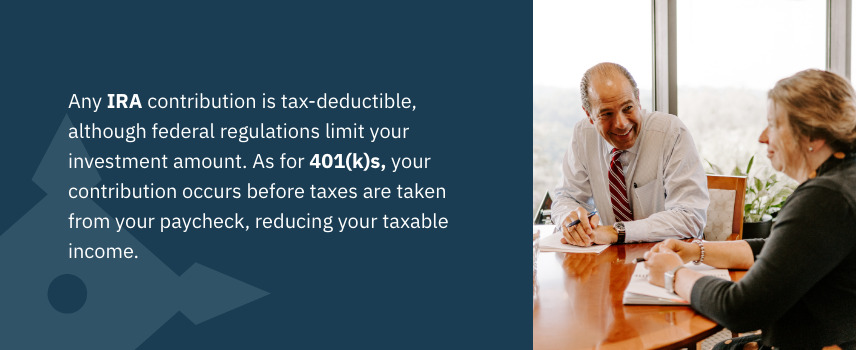Tax-Saving Strategy for Investors

Written by: Mike Blehar | Founding Partner & Chief Growth Officer
At Fort Pitt Capital Group, we believe it’s never too early to start thinking of ways to save money on next year’s taxes. Beginning the process early can help you find strategies that will reduce the amount you pay. Then, you can implement your tax-saving strategy in 2022 and beyond.
What Is a Tax-Saving Strategy?
Taxes are a part of life for all adults, especially if you invest. But what if you could limit the amount you have to pay in taxes each year while still following a successful investment plan? That’s where tax-saving strategies come in.
A tax-saving strategy is any tactic that helps you reduce the amount of your income or investment return that is taxable. Various tax-saving methods help people like yourself get more from their money. A few of the most common tax-saving strategies include:
- Maintaining a diverse range of account types that each treat taxes differently.
- Investing in assets that carry tax benefits, like municipal bonds and mutual funds.
- Fueling your tax-efficient investments with funds from tax-efficient accounts.
- Avoiding frequent withdrawals on investments that yield taxable returns.
- Filing investment losses to count against taxable capital gains.
A Tax-Saving Strategy for Investors
Fort Pitt Capital Group has found a strategy to help you save if you have mutual funds. Click the video below to watch Fort Pitt Capital Group’s Mike Blehar explain a portfolio management strategy that can help you save taxes in the future. After viewing the video, read on to learn more about mutual fund taxes.
Understanding Mutual Fund Taxes
Each year, mutual funds must distribute all of their dividends and capital gains by December 31, regardless of whether the mutual fund makes money or not. It can be frustrating to receive a large tax bill when you earn little on the fund.
Regular income is taxed at a higher rate than capital gains and qualified dividends. Your tax rate depends on what type of distribution you receive. You may choose long- or short-term capital gains or different types of qualified dividends.
You have to pay taxes on mutual funds no matter how you take the distribution, whether in cash or by reinvesting in more shares. The fund sends a 1099-DIV to the Internal Revenue Service (IRS) at the end of the year. If the fund sells securities, you may also have to pay taxes on those transactions.
Even if you purchase fund shares right before the distribution, you still need to pay taxes on any gains made during the rest of the year before you bought the shares. Depending on the fund’s turnover rate, you may also get higher capital gains than if you waited until after distribution.
Tax-Saving Strategy Implementation
Fort Pitt Capital Group did a study earlier this year and discovered that mutual fund portfolios distributed nearly twice the capital gain distributions over ten years compared to a portfolio of individual securities. If you are utilizing mutual funds in a taxable account, you know how frustrating it can be some years to get a large tax bill even though the mutual funds returned very little. However, there is a way to remedy this! At Fort Pitt Capital Group, we can save our clients money by using individual securities in taxable accounts.
You can trust our team to find tax-saving strategies that work for you. Our taxes and portfolio management experience offers us insight into ways we can assist you with saving money in the long run on taxes. We can walk you through our approach, so you’ll understand why we recommend this action.
Ensure You Utilize Tax-Efficient Accounts
Using tax-efficient accounts for your investments is crucial to any effective tax-saving strategy. A tax-efficient account is any account that benefits from either tax deferral or complete tax exemption. When you use a tax-efficient account for investments, you’ll be able to deduct any investment contributions that come through the account. The deduction or deferral will reduce the taxes you pay when withdrawing from your investment.
Two of the most common tax-efficient accounts for investors are individual retirement accounts (IRAs) and 401(k)s. Any IRA contribution is tax-deductible, although federal regulations limit your investment amount. As for 401(k)s, your contribution occurs before taxes are taken from your paycheck, reducing your taxable income. Similar contribution limits apply to 401(k) accounts.
IRAs and 401(k)s are ripe with opportunities to practice and understand tax efficiency. They encourage tax-efficient practices before retirement. You’ll funnel money toward these accounts paycheck after paycheck, only withdrawing when you retire. The result is a prolonged window for tax-free or low-tax investing. Later in life, the money you invest now will become a consistent income source during retirement. With frequent transactions taking place, it’s wise to choose a tax-efficient account like an IRA or 401(k).
Why Choose Fort Pitt Capital Group?
Fort Pitt Capital Group has over 20 years of experience assisting people with their financial planning. We handle taxes, investing, and various other concerns. Our team of in-house financial advisors help with everything from private wealth management to individual financial advisory. We can also aid you with portfolio management and taxes.
When you select our services, you receive many benefits, including:
- Exceptional client service: We prioritize our clients. Keeping you informed remains our principal focus, and we always have time to talk with you.
- Thoughtful investment strategies: We use our knowledge and experience to tailor strategies to fit your needs. Everyone has different goals, and we help you achieve yours through smart strategizing.
- Enhanced transparency: You stay informed throughout the investment and planning process. We offer suggestions but won’t make changes without your approval. Everything we do is 100% transparent.
- Key internal knowledge: Everyone on our team fits together to offer you knowledgeable guidance across the board. We can handle portfolio management, tax-saving strategy, financial planning, and more. Our team relies on years of success to learn and apply lessons learned to your account.
Talk With an Advisor
Interested in receiving further guidance? Fort Pitt Capital Group can start you on the path toward greater tax efficiency. Read about our individual services and how we can help you. If you’d like to learn more about how this tax-saving strategy works, please contact our firm. We can do a complete analysis of your portfolio and let you know how to help save you taxes.
About the Author:
Mike Blehar
Founding Partner & Chief Growth Officer
Fort Pitt Capital Group, LLC
680 Andersen Drive, Pittsburgh, PA 15220
(412) 921-1822 | mblehar@fortpittcapital.com





